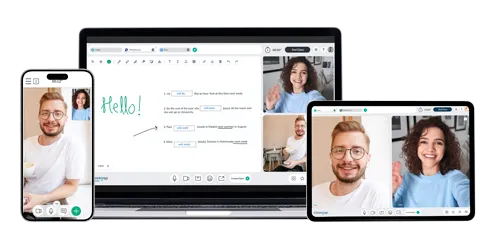Learn with online tutoring from anywhere in the world
✓ Meet the tutor. Try 20 min. for free
✓ Virtual classroom for your lessons
✓ More than 100 subjects to choose from

Excellent

4.5 out of 5 based on 1539 reviews

Online language lessons with native tutors from all over the world
Learn languages online with the world's best tutors

Online English tutors
5,894 teachers

Online Spanish tutors
3,896 teachers

Online French tutors
1,616 teachers

Online German tutors
555 teachers

Online Italian tutors
1,266 teachers

Online Chinese tutors
820 teachers

Online Portuguese tutors
283 teachers

Online Russian tutors
231 teachers
See more languages
Prepare for a test, learn a new subject or develop new skills
Learn or improve in over 100 different subjects: maths, physics, programming, marketing...
Languages Academic Subjects Maths Physics Chemistry Spanish for childrenMore than 500k students a year rely on Classgap
Flexible
Choose a tutor who works around you and your schedule
Secure
We take care of everything. You just have to enjoy your classes
Qualified tutors
Achieve your goals with more than 12,000 qualified teachers
Save money
Great value classes - no tuition fees or minimum number of hours
How does Classgap work?
It's easy! Live classes with an online private tutor
Find your perfect tutor
You'll find your ideal tutor among the thousands who are registered on our platform. They wil tailor the classes to your needs and help you to achieve your goals.
1


2
You choose the time
Choose an online tutor for the time and date you want, and enjoy the flexibility of online classes.
Learn in our virtual classroom
We've designed a virtual classroom with everything you'll need for your classes: video conferencing, digital whiteboard, online document editor, Google Drive and YouTube integration...
3

100% Satisfaction guarantee
If you are not completely satisfied with your first class, we will help you find another tutor, or refund you.
These students started out like you
3 million students achieve their goals, find out more about their experience

David
Learning English
I'm learning English with Classgap and I'm delighted with my teacher. It's like having face-to-face classes, but without having to move and they fit around my schedule.

Share a live video with your tutor of your favorite song so that you can understand it.

Alfred
Maths student
The experience has exceeded my expectations. Interacting with my tutor is very easy.

In the virtual classroom, you can use the "whiteboard" tool to solve any formulae or other problems.

Alexandra
Graphic design student
The virtual classroom experience is no different from the face-to-face experience.

With the online document tool of the virtual classroom, you will be able to perform live exercises.


